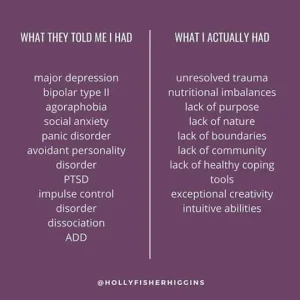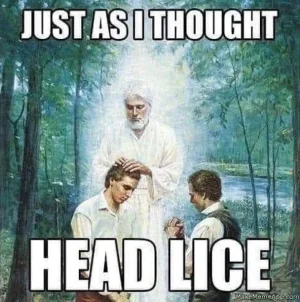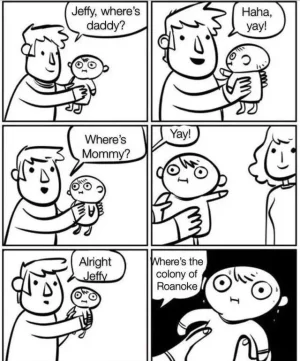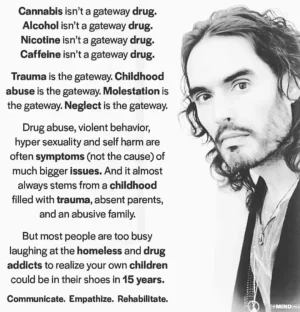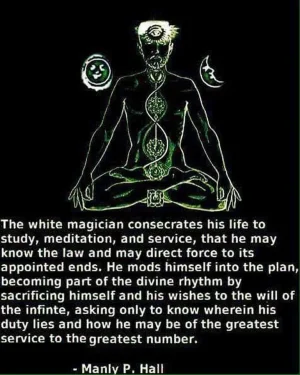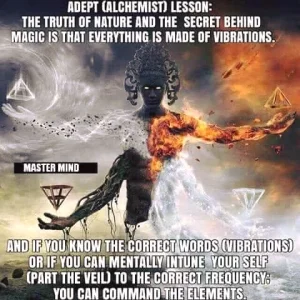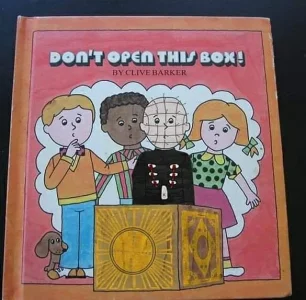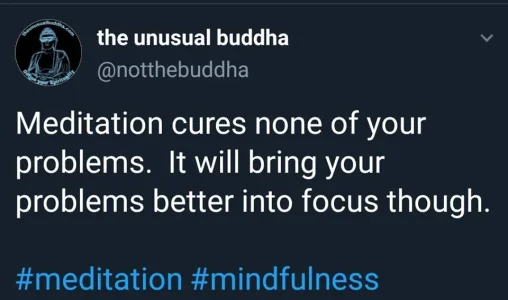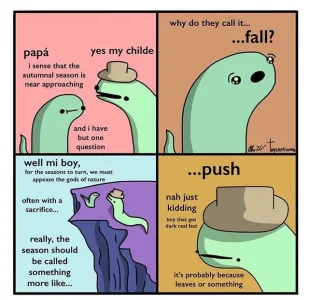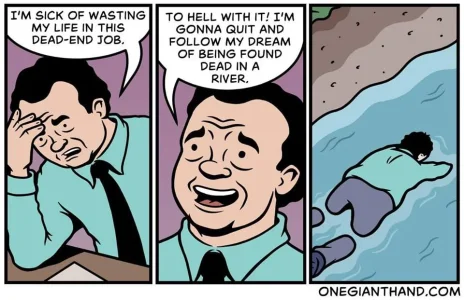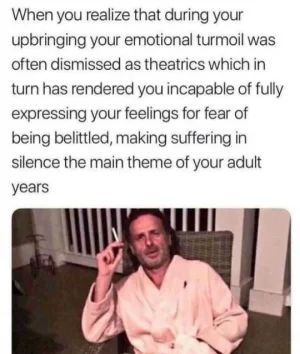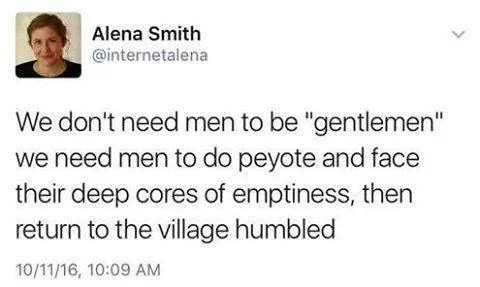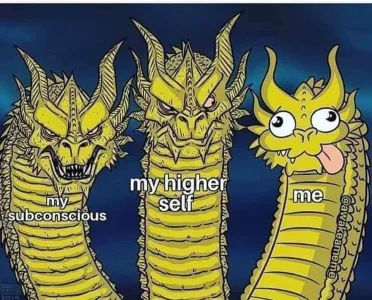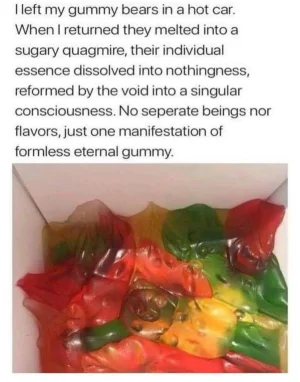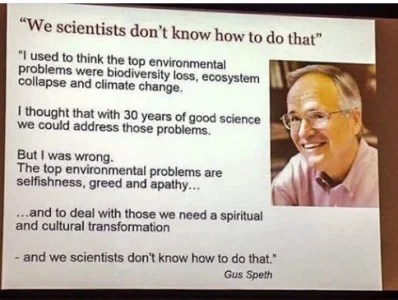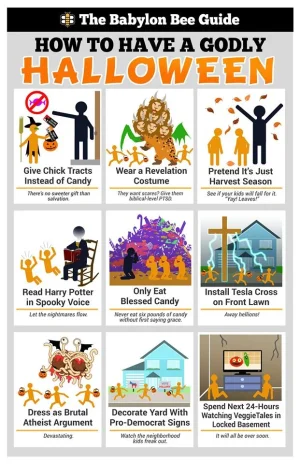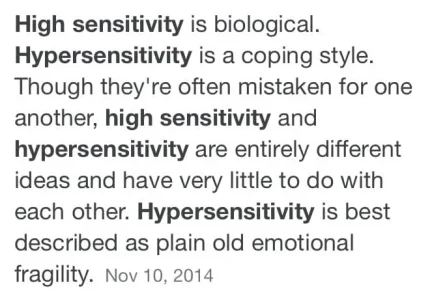You are using an out of date browser. It may not display this or other websites correctly.
You should upgrade or use an alternative browser.
You should upgrade or use an alternative browser.
Merkabah
- Thread starter Skarekrow
- Start date
More options
Who Replied?Skarekrow
~~DEVIL~~
- MBTI
- Ni-INFJ-A
- Enneagram
- Warlock
Why is the INFJ destined to constant critical thinking of “self"?
Which can be a horrible thing in the right circumstances, while a blessing in others.
I feel one must reach a point where they let go of the negative inward focus and find the narrative where self-improvement is done in a positive manner to help us grow - and not due to a feeling your “self” is lacking something or that some part of you is “wrong” in one way or another.
Enjoy the article!
IMO there is a happy medium between skepticism and belief.
Are you bewitched?
Thoughts?
:<3white:
Op-Ed —
Comfort zones are a curious thing.
So warm and secure.
So safe and reassuring.
So satisfying and certain.
Beliefs have a similar effect on us.
Especially the core beliefs that we take for granted.
But beliefs are comfort zones with reinforced invulnerability; or, at least, the illusion of it.
Such reinforcements are like prison bars that most of us are not even aware of.
We’re so completely indoctrinated, so utterly pre-programmed, that we don’t even know that we don’t know that we’ve been conditioned to blindly believe in something simply because enough people convinced us it was true.
The problem with reinforced comfort zones is that there is no growth.
A regular comfort zone, you can stretch.
A reinforced comfort zone, you’re usually not even aware it needs to be stretched.
A regular comfort zone allows for trial and error, it allows for questioning, and so there is at least potential for self-improvement and self-overcoming.
But a reinforced comfort zone does not allow for trial and error.
It doesn’t allow for “blasphemous” questioning, because it is taken for granted as already perfect or “simply the way it is.”
Regular comfort zones can be healthy, giving us a safe haven, a place where we can heal and lick our wounds.
But reinforced comfort zones are unnecessary safety nets based upon fear (of God, the Unknown, Death) placation, and self-pity.
It’s a place where cognitive dissonance rules and any notion of attempting to think outside the box is met with: You simply need to have faith in the “box”.
The Battle Against Bewitchment:
Self-Inflicted Philosophy is at the forefront of the battle against bewitchment.
Self-inflicted philosophy is about upsetting settled minds.
It’s about toppling the reinforced comfort zones of blind belief.
It’s about flattening the “box” that everyone talks a big game about thinking outside of but when it really comes down to it, they cling to the “box” out of fear of the unknown or out of faith in what they believe they know.
Foremost, self-inflicted philosophy is about questioning the self to the nth degree through self-interrogation.
But you can only get so far in such questioning before you are met with the reinforced comfort zone of a blind belief.
So, self-inflicted philosophy is also about questioning the layer-upon-layer of cultural, political, and religious indoctrination that led to that reinforced comfort zone to begin with.
When you don the cloak of a self-inflicted philosopher, no belief, no matter how true it may seem, is off the hook for being questioned with ruthless skepticism and unwavering circumspection.
In the battle against bewitchment, the destruction of a belief, no matter how powerful, is mere collateral damage to the Occam’s razor of universal truth. Hell, even “universal truth” is not beyond questioning.
When you don the cloak of a self-inflicted philosopher, the concept of belief is nixed from your interpretation of the universe.
There is no place for belief here, only thought, only deep inquiry, only imaginative curiosity.
You replace all usage of “belief” or “believe” with “thought” or “think”.
You don’t believe that you certainly exist: you “think” that you “probably” exist.
But you could be wrong.
So you remain circumspect, for even your interpretation of your own existence could be an illusion, no matter how “true” it may feel.
There will be those who will say, “You are merely believing that you don’t believe.”
But that is patently false, because you are not “believing” in non-belief, you are “thinking/inquiring/imagining” through non-belief, with the understanding, the flexibility that your thinking “could” be wrong.
And that’s the rub: it is much easier to alter a thought than a belief.
It is almost impossible to alter a belief.
You are more likely to question a thought than you are a belief.
And so, rather than get trapped in a reinforced comfort zone, you stay ahead of the curve by thinking rather than believing, and then by questioning what you think so that you don’t accidentally begin to believe it.
In the spirit of upsetting settled minds, you don’t “believe” in having an unsettled mind, you “think” that having an unsettled mind is more productive, more progressive, and more open-minded than having a settled mind (an unquestioning belief).
You realize that belief in general is counterproductive, because you understand that the human mind is a delusion-generator rather than a truth-generator. It pumps out delusions like a spider pumps out webs.
But, unlike the spider it tends to get caught in them.
Thereby, you understand that the only window to truth is through a questioning, circumspect, and a skeptical mindset, not through an unquestioning, dogmatic, and certain mindset.
The only solution to a delusion-generator is a question-generator.
Luckily, the human brain is both.
As a self-inflicted philosopher, you don’t believe that this is certainly true; rather, you think that this is probably true.
And you’re willing to question everything to “prove” it.
Indeed, you’ve transformed Descartes’ “I think therefore I am” into I think, therefore I question.
Tapping into the question-generator
The problem with the human brain is that is never knows when it has been duped by a delusion, so it is almost always better to not believe anything just in case it’s a delusion.
A kind of reverse Pascal’s Wager.
It’s almost always better to, as Aristotle suggested, “entertain a thought without accepting it.”
Just take it all into consideration and let it pass through the sieve of probability.
Then, whatever doesn’t insult your soul, think about it, dissect it, inquire about it.
Be curious about it. Just don’t make the mistake of believing it.
You are more likely to grasp the universe “as it really is” by questioning it than by believing it.
You don’t believe the universe is certainly a certain way; rather, you think the universe may be a certain way, but you’re willing to question further so as to get you closer to the way the universe “really is”.
If you cling to a particular belief of how the universe is, then you block yourself from ever getting closer to the universe “as it really is.”
Better to simply not have a belief in the first place.
Better to simply think and keep the motor running on the question-generator so as to keep the delusion-generator in check.
The opposite of belief is neither disbelief nor doubt, but clarity of a thought.
Without beliefs reinforcing the comfort zone, you are liberated to stretch it.
You are clear enough to think outside it, you are courageous enough to question it.
When the reinforcements fall away, the comfort zone becomes a sacred rather than stagnant place.
It is free to grow through self-improvement rather than remain stuck in self-reassurance.
Indeed, without beliefs cluttering the mindset, you’re finally able to drop the “set” and move into “mind.”
Free of the “mindset” of a settled mind, you move into the mindfulness of a questioning mind.
You become a walking, talking, question-generator, able to consistently counter-balance the delusion-generator of the human condition.
You’re ahead of the curve, surfing Aslam’s Infinite Circle on the surfboard of Occam’s razor.
In absolute awe over the beautiful unfolding of an ultimately unknowable universe.
On the edge of your own curiosity, questioning all “answers” countering all beliefs, elusive of all delusions.
You’re a self-inflicted philosopher, and not even God is safe from your ruthless inquiry.
Which can be a horrible thing in the right circumstances, while a blessing in others.
I feel one must reach a point where they let go of the negative inward focus and find the narrative where self-improvement is done in a positive manner to help us grow - and not due to a feeling your “self” is lacking something or that some part of you is “wrong” in one way or another.
Enjoy the article!
IMO there is a happy medium between skepticism and belief.
Are you bewitched?
Thoughts?
:<3white:
The Battle Against Bewitchment:
Upsetting Settled Minds
“Philosophical thinking that doesn’t do violence to one’s settled mind is no philosophical thinking at all.”
- Rebecca Goldstein
By Gary Z McGee

Upsetting Settled Minds
“Philosophical thinking that doesn’t do violence to one’s settled mind is no philosophical thinking at all.”
- Rebecca Goldstein
By Gary Z McGee

Op-Ed —
Comfort zones are a curious thing.
So warm and secure.
So safe and reassuring.
So satisfying and certain.
Beliefs have a similar effect on us.
Especially the core beliefs that we take for granted.
But beliefs are comfort zones with reinforced invulnerability; or, at least, the illusion of it.
Such reinforcements are like prison bars that most of us are not even aware of.
We’re so completely indoctrinated, so utterly pre-programmed, that we don’t even know that we don’t know that we’ve been conditioned to blindly believe in something simply because enough people convinced us it was true.
The problem with reinforced comfort zones is that there is no growth.
A regular comfort zone, you can stretch.
A reinforced comfort zone, you’re usually not even aware it needs to be stretched.
A regular comfort zone allows for trial and error, it allows for questioning, and so there is at least potential for self-improvement and self-overcoming.
But a reinforced comfort zone does not allow for trial and error.
It doesn’t allow for “blasphemous” questioning, because it is taken for granted as already perfect or “simply the way it is.”
Regular comfort zones can be healthy, giving us a safe haven, a place where we can heal and lick our wounds.
But reinforced comfort zones are unnecessary safety nets based upon fear (of God, the Unknown, Death) placation, and self-pity.
It’s a place where cognitive dissonance rules and any notion of attempting to think outside the box is met with: You simply need to have faith in the “box”.
The Battle Against Bewitchment:
Philosophy is a battle against the bewitchment of our intelligence by means of language.”
– Ludwig Wittgenstein
– Ludwig Wittgenstein
Self-Inflicted Philosophy is at the forefront of the battle against bewitchment.
Self-inflicted philosophy is about upsetting settled minds.
It’s about toppling the reinforced comfort zones of blind belief.
It’s about flattening the “box” that everyone talks a big game about thinking outside of but when it really comes down to it, they cling to the “box” out of fear of the unknown or out of faith in what they believe they know.
Foremost, self-inflicted philosophy is about questioning the self to the nth degree through self-interrogation.
But you can only get so far in such questioning before you are met with the reinforced comfort zone of a blind belief.
So, self-inflicted philosophy is also about questioning the layer-upon-layer of cultural, political, and religious indoctrination that led to that reinforced comfort zone to begin with.
When you don the cloak of a self-inflicted philosopher, no belief, no matter how true it may seem, is off the hook for being questioned with ruthless skepticism and unwavering circumspection.
In the battle against bewitchment, the destruction of a belief, no matter how powerful, is mere collateral damage to the Occam’s razor of universal truth. Hell, even “universal truth” is not beyond questioning.
When you don the cloak of a self-inflicted philosopher, the concept of belief is nixed from your interpretation of the universe.
There is no place for belief here, only thought, only deep inquiry, only imaginative curiosity.
You replace all usage of “belief” or “believe” with “thought” or “think”.
You don’t believe that you certainly exist: you “think” that you “probably” exist.
But you could be wrong.
So you remain circumspect, for even your interpretation of your own existence could be an illusion, no matter how “true” it may feel.
There will be those who will say, “You are merely believing that you don’t believe.”
But that is patently false, because you are not “believing” in non-belief, you are “thinking/inquiring/imagining” through non-belief, with the understanding, the flexibility that your thinking “could” be wrong.
And that’s the rub: it is much easier to alter a thought than a belief.
It is almost impossible to alter a belief.
You are more likely to question a thought than you are a belief.
And so, rather than get trapped in a reinforced comfort zone, you stay ahead of the curve by thinking rather than believing, and then by questioning what you think so that you don’t accidentally begin to believe it.
In the spirit of upsetting settled minds, you don’t “believe” in having an unsettled mind, you “think” that having an unsettled mind is more productive, more progressive, and more open-minded than having a settled mind (an unquestioning belief).
You realize that belief in general is counterproductive, because you understand that the human mind is a delusion-generator rather than a truth-generator. It pumps out delusions like a spider pumps out webs.
But, unlike the spider it tends to get caught in them.
Thereby, you understand that the only window to truth is through a questioning, circumspect, and a skeptical mindset, not through an unquestioning, dogmatic, and certain mindset.
The only solution to a delusion-generator is a question-generator.
Luckily, the human brain is both.
As a self-inflicted philosopher, you don’t believe that this is certainly true; rather, you think that this is probably true.
And you’re willing to question everything to “prove” it.
Indeed, you’ve transformed Descartes’ “I think therefore I am” into I think, therefore I question.
Tapping into the question-generator
“It is far better to grasp the universe as it really is than to persist in delusion, however satisfying and reassuring.”
– Carl Sagan
– Carl Sagan
The problem with the human brain is that is never knows when it has been duped by a delusion, so it is almost always better to not believe anything just in case it’s a delusion.
A kind of reverse Pascal’s Wager.
It’s almost always better to, as Aristotle suggested, “entertain a thought without accepting it.”
Just take it all into consideration and let it pass through the sieve of probability.
Then, whatever doesn’t insult your soul, think about it, dissect it, inquire about it.
Be curious about it. Just don’t make the mistake of believing it.
You are more likely to grasp the universe “as it really is” by questioning it than by believing it.
You don’t believe the universe is certainly a certain way; rather, you think the universe may be a certain way, but you’re willing to question further so as to get you closer to the way the universe “really is”.
If you cling to a particular belief of how the universe is, then you block yourself from ever getting closer to the universe “as it really is.”
Better to simply not have a belief in the first place.
Better to simply think and keep the motor running on the question-generator so as to keep the delusion-generator in check.
The opposite of belief is neither disbelief nor doubt, but clarity of a thought.
Without beliefs reinforcing the comfort zone, you are liberated to stretch it.
You are clear enough to think outside it, you are courageous enough to question it.
When the reinforcements fall away, the comfort zone becomes a sacred rather than stagnant place.
It is free to grow through self-improvement rather than remain stuck in self-reassurance.
Indeed, without beliefs cluttering the mindset, you’re finally able to drop the “set” and move into “mind.”
Free of the “mindset” of a settled mind, you move into the mindfulness of a questioning mind.
You become a walking, talking, question-generator, able to consistently counter-balance the delusion-generator of the human condition.
You’re ahead of the curve, surfing Aslam’s Infinite Circle on the surfboard of Occam’s razor.
In absolute awe over the beautiful unfolding of an ultimately unknowable universe.
On the edge of your own curiosity, questioning all “answers” countering all beliefs, elusive of all delusions.
You’re a self-inflicted philosopher, and not even God is safe from your ruthless inquiry.
G4RiiM
Banned
- MBTI
- .
lmao at that last one
"That’s where our schools have it backward...instead of finding and encouraging the things that the individual child is good at or interested in at the very least - they drill the shit you aren’t good at into your head over and over and over, focusing on the bad grades in certain subjects instead of the good grades in others."
Story of my life.. But I'm a rebel baby
"We lived in a haunted house when I was a child...like a legit one...I finally got my Mom to admit it a while back after all these years!
“Oh...well there was that time this really loud, deep, groan came out of the bedroom you and M were in! Of course you were too little to have made such a noise.”
well dang, that's spooky. I had this one occasion.. idk if I alrdy posted it on here.. this raw animalistic roar came outta me that rly took me and others by surprise.. Maybe you got a lion hidin inside of you.. But then again if it was you you'd prolly know..
"Anyhow...back on topic...I would have lucid dreams but then it would spit me out into an OOBE.
I would wander around my house trying to get my parents to talk to me and just feeling generally terrified."
Ive had occasions I thought the ppl trying to murder me in my dreams might be OOB or astral projecting or something..
Last edited:
Skarekrow
~~DEVIL~~
- MBTI
- Ni-INFJ-A
- Enneagram
- Warlock
lmao at that last onefuck those bastards
"That’s where our schools have it backward...instead of finding and encouraging the things that the individual child is good at or interested in at the very least - they drill the shit you aren’t good at into your head over and over and over, focusing on the bad grades in certain subjects instead of the good grades in others."
Story of my life.. But I'm a rebel baby
"We lived in a haunted house when I was a child...like a legit one...I finally got my Mom to admit it a while back after all these years!
“Oh...well there was that time this really loud, deep, groan came out of the bedroom you and M were in! Of course you were too little to have made such a noise.”
well dang, that's spooky. I had this one occasion.. idk if I alrdy posted it on here.. this raw animalistic roar came outta me that rly took me and others by surprise.. Maybe you gat a lion hidin inside of you.. But then again if it was you you'd prolly know..
"Anyhow...back on topic...I would have lucid dreams but then it would spit me out into an OOBE.
I would wander around my house trying to get my parents to talk to me and just feeling generally terrified."
Ive had occasions I thought the ppl trying to murder me in my dreams might be OOB or astral projecting or something..
Yeah...I think as far as education goes it’s the same shitty story for many an INFJ/INTJ...not sure about those FPs and TPs?
I remember having an IQ test administered when I was in the 4th grade to make sure I didn’t have any learning disabilities since I fucking hated just about every single moment of school from elementary to HS to most of college at that.
Oh, hey look...this 4th grade kid reads and comprehends at a college level...by all means lets do nothing with that information - I remember wanting to tear my hair out when kids were sounding out words...it was one thing that used to really irritate me as a child...I was obviously bored.
And then with mathematics...I couldn’t take the repetition of it.
I would do the first few problems on a worksheet of 20 or so and then stare out the window.
Why do all 20 when we learned how to do it already...let’s move on!?
Not saying I was a child genius or anything, but my brain and wiring was very different than the other kids in my class.
I remember always feeling like I was out of place...there was this movie that came out when I was in the 1st grade I think it was...”DARRYL”, I believe.
It's about this kid who learns on accident that he is actually a robot and was created by the government and his memories are false, his parents, everyone is in on it....and I thought - that must be it, I’m a robot or something.
As for being a rebel, in 3rd grade I threw my math book in the garbage and told the teacher and everyone I lost it....conveniently...as if they couldn’t just get me another one (they were the kind you used to write in).
LOL
Freakin childhood INFJ crap.
Yeah...I believe you about the loin roar...this was just me and my brother and he was 3 while I was 2...it was a deep moan/groan and loud enough that my Vietnam vet dad went and grabbed his billy club thinking someone was in the house.
No one was...nor did he find anyone outside.
I don’t remember that one though, I just have my Mom’s recollection to go on.
I believe that I have met other people who were lucid in my own lucid dreams...it’s pretty exciting and there does seem to be a difference with that person...as if everyone else is a cardboard cut out and they are real like you.
Also...there are recorded incidents elsewhere and throughout history of people seeing someone in a dream only to learn they had the same dream, or learning of a loved one passing, any number of precognitive clues as well have been gleaned from such dreams.
It’s all some wild stuff...thanks for sharing your perspective and thoughts about it even if it isn’t your cup of tea!
Take care man!
:<3white:
Last edited:
Skarekrow
~~DEVIL~~
- MBTI
- Ni-INFJ-A
- Enneagram
- Warlock
A most excellent read!
Enjoy!
Abstract—This article reports five same-family cases of the reincarnation type occurring in contemporary Japan.
The discussion will be within a set of widely adopted operative assumptions set out by Dr. Ian Stevenson and his colleagues: Streams of consciousness survive death of body and become associated with another body at another time, During the intermission pe- riod between lives, the discarnate mind retains the ability for psi percep- tions and interactions, and may exercise choice in the selection of parents.
The theoretical part of the present paper is with the limitation concerning auxiliary assumptions (Sudduth 2016), and the interpretations of the data adopted here (the survival and reincarnation hypotheses) are open to alter- native analyses (notably, the Living Agent Psi hypothesis) as pointed out by Braude (1997, 2003, 2013) and Sudduth (2009, 2013, 2016), but it is beyond the scope of the present paper to deal with these issues.
Of the five cases, the first three involve a deceased child appearing to be reborn to the same mother.
One of the remaining two is a skipped-generation case, in which a deceased mother appears to have been reborn as a child of her daughter.
The other is a case in which a deceased child appears to have been reborn as a daughter of his elder brother.
This case also involves an “experimental birthmark.”
Enjoy!
Same-Family Cases of the Reincarnation Type in Japan
OHKADO MASAYUKI*
Faculty of General Education, Chubu University, Aichi, Japan
Division of Perceptual Studies, University of Virginia, Charlottesville, Virginia, USA ohkado@isc.chubu.ac.jp
* Following the convention in Japanese, the name of the author as well as other Japanese names appearing in the article are written in the order of the family name followed by the given name.
Submitted February 27, 2017; Accepted September 7, 2017; Published December 30, 2017
OHKADO MASAYUKI*
Faculty of General Education, Chubu University, Aichi, Japan
Division of Perceptual Studies, University of Virginia, Charlottesville, Virginia, USA ohkado@isc.chubu.ac.jp
* Following the convention in Japanese, the name of the author as well as other Japanese names appearing in the article are written in the order of the family name followed by the given name.
Submitted February 27, 2017; Accepted September 7, 2017; Published December 30, 2017
Abstract—This article reports five same-family cases of the reincarnation type occurring in contemporary Japan.
The discussion will be within a set of widely adopted operative assumptions set out by Dr. Ian Stevenson and his colleagues: Streams of consciousness survive death of body and become associated with another body at another time, During the intermission pe- riod between lives, the discarnate mind retains the ability for psi percep- tions and interactions, and may exercise choice in the selection of parents.
The theoretical part of the present paper is with the limitation concerning auxiliary assumptions (Sudduth 2016), and the interpretations of the data adopted here (the survival and reincarnation hypotheses) are open to alter- native analyses (notably, the Living Agent Psi hypothesis) as pointed out by Braude (1997, 2003, 2013) and Sudduth (2009, 2013, 2016), but it is beyond the scope of the present paper to deal with these issues.
Of the five cases, the first three involve a deceased child appearing to be reborn to the same mother.
One of the remaining two is a skipped-generation case, in which a deceased mother appears to have been reborn as a child of her daughter.
The other is a case in which a deceased child appears to have been reborn as a daughter of his elder brother.
This case also involves an “experimental birthmark.”
G4RiiM
Banned
- MBTI
- .
this 4th grade kid reads and comprehends at a college level...by all means lets do nothing with that information - I remember wanting to tear my hair out when kids were sounding out words...it was one thing that used to really irritate me as a child...I was obviously bored.
That sounds like a nightmare. I can relate, kinda. Don't think I'm on your genius level
I remember always feeling like I was out of place...
Yeah me too.. I can be popular and have a following, but it's hard for me to find soul with whom I connect on deeper levels.
Glad to meet you here.
As for being a rebel, in 3rd grade I threw my math book in the garbage and told the teacher and everyone I lost it....
By that time I think I had dropped packed boxes on kids heads for testing me, and brought my dads pocket knife from his fishing tackle box with me to school.. *OOPS*
.it was a deep moan/groan and loud enough that my Vietnam vet dad went and grabbed his billy club thinking someone was in the house.
Total badass
thanks for sharing your perspective and thoughts about it even if it isn’t your cup of tea!
Take care man!
Thank you for sharing yours too kind sir.
:<3black:
Skarekrow
~~DEVIL~~
- MBTI
- Ni-INFJ-A
- Enneagram
- Warlock
The festival of Samhain (“summer’s end”) was celebrated the night before the New Year, presided over by the Lord of the Dead (Welsh = Arawn, Irish = Donn).
The Celts traditionally recognized a twofold division of the year, summer running from Beltane (“fire of Bel” = Belenus, Celtic Christ), the Vernal Equinox to Samhain, (the Autumnal Equinox), and winter running from Samhain to Beltane.
During this festival, Celts believed the souls of the dead returned to mingle with the living and food was left on the doors for them.
In order to scare away the evil spirits, people would wear masks and light bonfires.
Large wickerwork figures were also constructed and burnt in mock sacrifice.
It is said in the exoteric tradition that the wickerwork figures represented a vegetation spirit.
The symbol of the figure with the appearance (empty shell = Klipoth) of a man can be readily recognized esoterically as the aspect of an initiate that must die (within the Alchemical Fires / Forge of Vulcan) in order for the real man to be born.
Skarekrow
~~DEVIL~~
- MBTI
- Ni-INFJ-A
- Enneagram
- Warlock
That sounds like a nightmare. I can relate, kinda. Don't think I'm on your genius level
Yeah me too.. I can be popular and have a following, but it's hard for me to find soul with whom I connect on deeper levels.
Glad to meet you here.
By that time I think I had dropped packed boxes on kids heads for testing me, and brought my dads pocket knife from his fishing tackle box with me to school.. *OOPS*
Total badass
Thank you for sharing yours too kind sir.
:<3black:
Nice to meet you and talk with you too man!
Yeah...I was always getting into trouble...maybe not to your own extent...but things like running away from the school in the first grade after I punched a kid in the mouth for hitting me above the waist in dodgeball then trying to say I was out...but then he kept hitting me with the ball over and over...I grabbed him by the shirt collar and gave him a good right in the mouth, lol.
I got upset at the whole flood of emotions that overtook me after getting in trouble and so was told to go clean up in the bathroom but decided to just leave that hell forsaken place.
They ALMOST called the cops, but then my Mom saw me walking down the street toward the house...which was really too far for me to walk at that age.
That’s that kind of crap I did...not so much directed at anyone...though I had my fair share of fights - usually because I was surrounded...I would always strike first in that case...usually at the leader who would start to cry and his friends would stare and say “Why did you do that?” Hmmm...because you’re being fuckos thinking you can mess with me...it was really due to the intense emotions an INFJ kid feels I think, and a lack of self-control.
It would reach a point where if I got cornered the switch would flip in my head and bam - sock you in the mouth or nose.
Then ride away as fast as I could on my bike, lmao.
I never started anything though...it never made sense to me why kids would act like that...I was never like that myself to anyone but I wasn’t as easy of a target as they thought I was either, haha.
Not to say I didn’t get my ass kicked a couple of times either.
Not a genius, thanks...my point was imho there are a lot of kids who have subjects that they excel in that end up receiving less attention/instruction as the subjects you do not.
It’s a missed opportunity and I find that unfortunate.
Yeah, my Dad was not someone to physically tangle with.
He was a Recon Sargent in the Army (drafted)...so he was very often behind enemy lines.
The billy club he brought home from the war, with all it’s dents and gouges.
(along with his 9mm Browning kept in the attic)
On the weekend he would nap sometimes and catch up on sleep as he worked in the oilfields.
We all knew that you stood in the doorway to wake him up because he would literally jump up out of bed ready to kill you.
I wasn’t allowed to sleep in their bed as a child after he woke up with his hands around my toddler neck (not squeezing thank god), while he dreamt he was choking a Viet-Cong soldier to death.
He had bad PTSD for several decades and it never went away fully.
He never turned to drinking or anything like that though...he was mentally very strong as well.
RIP
Hope you have a wonderful day and let me know if you need anything!
:<3white:
Last edited:
G4RiiM
Banned
- MBTI
- .
I punched a kid in the mouth for hitting me above the waist in dodgeball then trying to say I was out...but then he kept hitting me with the ball over and over...I grabbed him by the shirt collar and gave him a good right in the mouth, lol.
Aint that how kids learn though? Maybe he learned he likes math better
They ALMOST called the cops
I got a love hate relationship with them
Not to say I didn’t get my ass kicked a couple of times either.
You live you learn..
I wasn’t allowed to sleep in their bed as a child after he woke up with his hands around my neck (not squeezing thank god), while he dreamt he was choking a Viet-Cong soldier to death.
He had bad PTSD for several decades and it never went away fully.
That's sad.. To me it sounds like yall learned to live with it and he was a real man.
He never turned to drinking or anything like that though...he was mentally very strong as well.
RIP
Respect.
Hope you have a wonderful day and let me know if you need anything!
Thx man
:<3black:
Skarekrow
~~DEVIL~~
- MBTI
- Ni-INFJ-A
- Enneagram
- Warlock
Skarekrow
~~DEVIL~~
- MBTI
- Ni-INFJ-A
- Enneagram
- Warlock
Good to know and remember!
Enjoy!
There’s a lot of bad news out there when it comes to health, mostly of the “here’s another one of your favourite things in the world that is going to kill you” variety.
So good news must be grasped as a drowning man grasps a friendly dolphin – and here is some good news of the very goodest variety.
Turns out, diet and exercise are not the most important factors in determining wellness.
Yes! All right! Bring me another burger while I lean this recliner a little further back, it’s party time!
OK, well, maybe not that. It’s not that diet and exercise don’t matter, it’s that there’s some strong evidence that there’s something that matters even more, according to a new book by psychiatrist Kelli Harding.
And that something is: kindness.

Yep, science is backing this one up: your health can be vastly improved by the presence of loving people in your life who treat you kindly.
And, as it happens, by you being kind and loving yourself: the benefits of hugs flow both ways.
In a nutshell, people who have a lot of kindness in their lives are healthier – live longer, and with better quality of life – than those whose personal interactions are marked by coldness and anger.
So the lesson here is: you still should go for a walk now and then and not eat too many pizzas, but it’s far more important to treat people well, and make sure you surround yourself with others who do the same.
Which is, in every way, a nice message to get.
Enjoy!
The Most Important Factor in
Wellbeing has Nothing to Do with Diet or Exercise
BEN POBJIE, 24 OCT 2019

Wellbeing has Nothing to Do with Diet or Exercise
BEN POBJIE, 24 OCT 2019

There’s a lot of bad news out there when it comes to health, mostly of the “here’s another one of your favourite things in the world that is going to kill you” variety.
So good news must be grasped as a drowning man grasps a friendly dolphin – and here is some good news of the very goodest variety.
Turns out, diet and exercise are not the most important factors in determining wellness.
Yes! All right! Bring me another burger while I lean this recliner a little further back, it’s party time!
OK, well, maybe not that. It’s not that diet and exercise don’t matter, it’s that there’s some strong evidence that there’s something that matters even more, according to a new book by psychiatrist Kelli Harding.
And that something is: kindness.

Yep, science is backing this one up: your health can be vastly improved by the presence of loving people in your life who treat you kindly.
And, as it happens, by you being kind and loving yourself: the benefits of hugs flow both ways.
In a nutshell, people who have a lot of kindness in their lives are healthier – live longer, and with better quality of life – than those whose personal interactions are marked by coldness and anger.
So the lesson here is: you still should go for a walk now and then and not eat too many pizzas, but it’s far more important to treat people well, and make sure you surround yourself with others who do the same.
Which is, in every way, a nice message to get.
Last edited:
Skarekrow
~~DEVIL~~
- MBTI
- Ni-INFJ-A
- Enneagram
- Warlock
This is pretty cool.
Enjoy!!
Consciousness is one of the brain's most enigmatic mysteries.
A new theory inspired by thermodynamics takes a high-level perspective of how neural networks in the brain transiently organize to give rise to memories, thought and consciousness.
The key to awareness is the ebb and flow of energy: When neurons functionally tag together to support information processing, their activity patterns synchronize like ocean waves.
This process is inherently guided by thermodynamic principles, which, like an invisible hand, promote neural connections that favor conscious awareness.
Disruptions in this process break down communication between neural networks, giving rise to neurological disorders such as epilepsy, autism or schizophrenia.
By using thermodynamic principles such as energy gradients, dissipation and approach to equilibrium, researchers have a way to characterize how neural phenomena happen and how they sometimes deviate toward neuropathological states, said study author Dr. Jose L. Perez Velazquez affiliated with the Ronin Institute in Montclair, NJ.
The results, funded by Novela Neurotech, were published in the open-access journal Frontiers in Neuroscience.
Energy States as a Guiding Principle
Scientists have long hypothesized that consciousness arises from the coordinated activity among neurons widely spread across the brain.
One framework, the Global Workspace Theory, posits that some brain regions integrate information over space and time across a large number of connected brain areas, resulting in data that is globally available for diverse processes such as memory, attention and language.
Another hypothesis, the Integrated Information Theory, holds that consciousness is the result of a heavily interconnected brain, the degree of which can be quantified.
Despite decades of work, these theories don't directly tackle the harder question: What are the principles guiding these connections such that consciousness arises in the brain?
As increasing effort focuses on communicating with locked-in patients and determining consciousness in intelligent machines, the pursuit of biological principles guiding brain organization becomes increasingly crucial.
The new work combines classical physics, particularly some laws of thermodynamics, with modern recordings of neural activity to paint a general framework of how changes in free energy—the amount of energy available inside a system—temporarily synchronizes the activity in neural networks.
During conscious states, the brain actively integrates and segregates sensory information and so consumes more energy than when unconscious.
Using available neural recordings from human participants during wakefulness, sleep, coma and seizures—each considered a brain "macrostate"—the team found that entropy during consciousness was higher than that during unconscious states.
As a concept, entropy can be interpreted and measured in specific ways.
Here, entropy is associated with the number of configurations of synchronized, or "connected," brain networks.
"Energy is dissipated as more neurons become connected," write Perez Velazquez and colleagues.
Models using thermodynamic equations show that healthy and conscious states have a tendency toward greater dissipation.
However, it is not just about how much free energy is in the brain.
Each macrostate is composed of multiple configurable micro states.
During conscious awareness, the brain has an optimal number of connected neural networks, and so many more microstates to support cognition.
In contrast, during unconscious states like seizures, there are too many connected neural networks resulting in fewer microstates—and so lower entropy and higher free energy, causing the brain to malfunction.
"To maintain healthy brain states, then, is not about the total amount of energy in the brain [...] but rather in how the energy is organized," say the authors.
A General Principle of Brain Organization
Together, viewing brain organization through the lens energy gradients and dissipation combines into a theory—or tentatively, a "principle"—that can separate healthy, conscious brain states from unconscious ones.
The team thus believes that their approach can be used to further elucidate what happens when consciousness breaks, for example, in certain epileptic seizures.
Using the principle, the team offered an interpretation about how normal brain activity can transition into abnormal states.
When neurons hyperactivate, it results in higher than normal synchrony that either lasts too long or reaches overly wide regions of the brain.
In other words, the brain settles on a state that is too stable.
This idea agrees with a previous interpretation of consciousness, detailed in the Brain-Behavior Continuum.
As a result, the brain has lower entropy and so reduced ability to form variable brain activity patterns.
That is, it has fewer microstates, resulting in fewer configurations of interacting neural networks, which deprives the brain of its usual ability to quickly and flexibly adapt to the outside world. In some cases, consciousness also crumbles.
The team has now laid out experiments to test the theory. Dr. Diego M. Mateos at the Instituto de Matemática Aplicada del Litoral-CONICET-UNL in Santa Fe, Argentina, and Dr. Ramon Guevara Erra at the Laboratoire Psychologie de la Perception CNRS in Paris, France also contributed to the work.
Enjoy!!
A new theory of brain organization takes aim at the mystery of consciousness


Consciousness is one of the brain's most enigmatic mysteries.
A new theory inspired by thermodynamics takes a high-level perspective of how neural networks in the brain transiently organize to give rise to memories, thought and consciousness.
The key to awareness is the ebb and flow of energy: When neurons functionally tag together to support information processing, their activity patterns synchronize like ocean waves.
This process is inherently guided by thermodynamic principles, which, like an invisible hand, promote neural connections that favor conscious awareness.
Disruptions in this process break down communication between neural networks, giving rise to neurological disorders such as epilepsy, autism or schizophrenia.
By using thermodynamic principles such as energy gradients, dissipation and approach to equilibrium, researchers have a way to characterize how neural phenomena happen and how they sometimes deviate toward neuropathological states, said study author Dr. Jose L. Perez Velazquez affiliated with the Ronin Institute in Montclair, NJ.
The results, funded by Novela Neurotech, were published in the open-access journal Frontiers in Neuroscience.
Energy States as a Guiding Principle
Scientists have long hypothesized that consciousness arises from the coordinated activity among neurons widely spread across the brain.
One framework, the Global Workspace Theory, posits that some brain regions integrate information over space and time across a large number of connected brain areas, resulting in data that is globally available for diverse processes such as memory, attention and language.
Another hypothesis, the Integrated Information Theory, holds that consciousness is the result of a heavily interconnected brain, the degree of which can be quantified.
Despite decades of work, these theories don't directly tackle the harder question: What are the principles guiding these connections such that consciousness arises in the brain?
As increasing effort focuses on communicating with locked-in patients and determining consciousness in intelligent machines, the pursuit of biological principles guiding brain organization becomes increasingly crucial.
The new work combines classical physics, particularly some laws of thermodynamics, with modern recordings of neural activity to paint a general framework of how changes in free energy—the amount of energy available inside a system—temporarily synchronizes the activity in neural networks.
During conscious states, the brain actively integrates and segregates sensory information and so consumes more energy than when unconscious.
Using available neural recordings from human participants during wakefulness, sleep, coma and seizures—each considered a brain "macrostate"—the team found that entropy during consciousness was higher than that during unconscious states.
As a concept, entropy can be interpreted and measured in specific ways.
Here, entropy is associated with the number of configurations of synchronized, or "connected," brain networks.
"Energy is dissipated as more neurons become connected," write Perez Velazquez and colleagues.
Models using thermodynamic equations show that healthy and conscious states have a tendency toward greater dissipation.
However, it is not just about how much free energy is in the brain.
Each macrostate is composed of multiple configurable micro states.
During conscious awareness, the brain has an optimal number of connected neural networks, and so many more microstates to support cognition.
In contrast, during unconscious states like seizures, there are too many connected neural networks resulting in fewer microstates—and so lower entropy and higher free energy, causing the brain to malfunction.
"To maintain healthy brain states, then, is not about the total amount of energy in the brain [...] but rather in how the energy is organized," say the authors.
A General Principle of Brain Organization
Together, viewing brain organization through the lens energy gradients and dissipation combines into a theory—or tentatively, a "principle"—that can separate healthy, conscious brain states from unconscious ones.
The team thus believes that their approach can be used to further elucidate what happens when consciousness breaks, for example, in certain epileptic seizures.
Using the principle, the team offered an interpretation about how normal brain activity can transition into abnormal states.
When neurons hyperactivate, it results in higher than normal synchrony that either lasts too long or reaches overly wide regions of the brain.
In other words, the brain settles on a state that is too stable.
This idea agrees with a previous interpretation of consciousness, detailed in the Brain-Behavior Continuum.
As a result, the brain has lower entropy and so reduced ability to form variable brain activity patterns.
That is, it has fewer microstates, resulting in fewer configurations of interacting neural networks, which deprives the brain of its usual ability to quickly and flexibly adapt to the outside world. In some cases, consciousness also crumbles.
The team has now laid out experiments to test the theory. Dr. Diego M. Mateos at the Instituto de Matemática Aplicada del Litoral-CONICET-UNL in Santa Fe, Argentina, and Dr. Ramon Guevara Erra at the Laboratoire Psychologie de la Perception CNRS in Paris, France also contributed to the work.
More information: Jose L. Perez Velazquez et al, On a Simple General Principle of Brain Organization,
Frontiers in Neuroscience (2019). DOI: 10.3389/fnins.2019.01106
Journal information: Frontiers in Neuroscience
Frontiers in Neuroscience (2019). DOI: 10.3389/fnins.2019.01106
Journal information: Frontiers in Neuroscience
Last edited:


